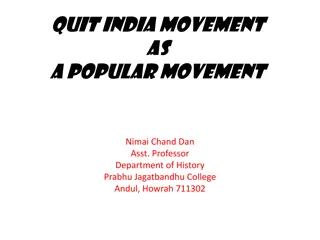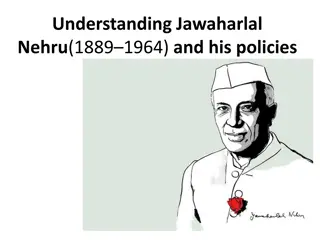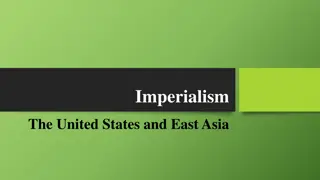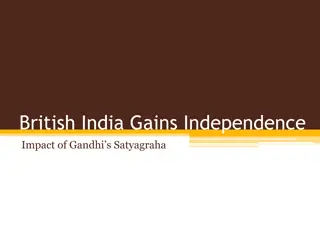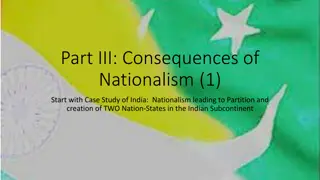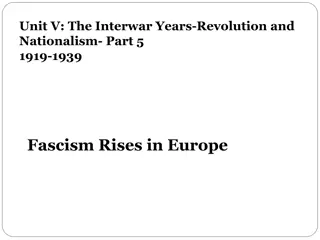The All India Hindu Mahasabha: History and Impact
The All India Hindu Mahasabha is a right-wing Hindu nationalist political party in India formed to protect Hindu community rights. Despite being old, it has had marginal influence on politics. The Mahasabha emphasized Hindu solidarity and social reform, founded in the early 1900s by leaders like Pan
2 views • 11 slides
The Shifting of India's Capital: The Story of New Delhi
The decision to move the capital of India from Calcutta to Delhi in 1911 led to the creation of Imperial Delhi, now known as New Delhi. This move was a reflection of British colonial rule in India, marked by controversies, cost overruns, and disagreements among architects. The shift was influenced b
1 views • 19 slides
Evolution of Modern Drama in English Literature: A Comprehensive Overview
Modern drama in English literature evolved through different phases from the late 19th to the mid-20th century, showcasing innovative techniques and themes. The revival of drama in the 20th century brought forth various trends and currents, reflecting social issues and nationalistic sentiments. This
0 views • 7 slides
Evolution of Medicine in Colonial South Asia
The evolution of medicine in colonial South Asia witnessed a transition from local traditional practices to the dominance of imported European medicine. This shift, marked by the establishment of imperial institutions and training of local physicians in Western techniques, led to a complex interplay
1 views • 5 slides
Impact of the Indian Council Act of 1892 on Indian Nationalism
The Indian Council Act of 1892 was a significant step towards representative government in colonial India, increasing Indian representation in legislative councils. While it did not fully meet nationalist demands, it indirectly fueled revolutionary movements and calls for a more aggressive anti-Brit
0 views • 18 slides
The Fall of the Soviet Union: Gorbachev's Reforms and Global Impact
In the late 20th century, the collapse of the Soviet Union under Gorbachev's leadership ushered in a new era of economic, political, and social change. Gorbachev's policies of glasnost and perestroika opened up Soviet society, leading to nationalist movements and ultimately the dissolution of the US
0 views • 12 slides
Overview of Quit India Movement and its Phases
The Quit India Movement was a significant event in India's struggle for independence, marked by various factors leading to its emergence, including the demise of the Civil Disobedience Movement and the rise of nationalist sentiments. The movement escalated in response to the outbreak of World War II
1 views • 9 slides
Jawaharlal Nehru: Visionary Leader and Architect of Modern India
Jawaharlal Nehru, a prominent leader of India's nationalist movement, played a crucial role in shaping the country's policies post-independence. As India's first Prime Minister, he focused on pillars like democracy, socialism, secularism, and nationalist unity. Nehru's domestic policies emphasized s
0 views • 8 slides
Gandhi's Marginalization in Indian Nationalist Politics from 1931-1947
The 1930 Salt Satyagraha propelled Gandhi into the heart of nationalist politics, challenging colonial rule. However, by the end of the decade, the tide shifted away from his influence towards a more conventional political landscape dominated by power negotiations and elections, leading to Gandhi's
4 views • 11 slides
Understanding Colonialism and Imperialism in Modern History
The discussion revolves around the impact of colonialism and imperialism on international relations, focusing on the historical context, economic consequences, and nationalist movements against colonial powers. Highlighting key players such as Great Britain, France, and Germany during the 19th centu
2 views • 14 slides
Understanding Nationalism in Political Science
Nationalism, a complex concept, defines the nation as the fundamental unit of political rule. It encompasses a mix of objective and subjective factors, including cultural, ethnic, and political traits. The definition of a nation is subjective, based on how its members perceive themselves as a distin
0 views • 27 slides
Unveiling Historical Contexts of Lagaan and Cricket in Colonial India
Explore the intricate historical contexts of the film "Lagaan" and the sport of cricket in colonial India. Delve into the political history, princely India dynamics, class, caste, region, religion complexities, and the economic significance in the British Empire's rule. Unveil the interplay of racis
0 views • 6 slides
History of Scouting and Guiding in India
The history of Scouting and Guiding in India dates back to 1909 when the first Scout Troop was established by Captain T.H. Baker in Bangalore. Over the years, the movement grew and efforts were made to include Indian boys. Nationalist leaders played a key role in promoting Scouting activities among
0 views • 35 slides
Unification of Italy in the 19th Century: Risorgimento Movement
The Unification of Italy in the 19th Century was driven by the Risorgimento nationalist movement, led by figures like Giuseppe Mazzini, Camillo Benso di Cavour, and Giuseppe Garibaldi. Cavour, as Chief Minister of Sardinia, played a crucial role in reorganizing the army and forming alliances to defe
1 views • 25 slides
Cases of Hate Speech in Public and Student Speech Scenarios
The content discusses instances of hate speech in two different scenarios. In the public employee speech case, a building inspector's tweets lead to his firing and subsequent legal action. In the student speech case, a high school junior's involvement in a white nationalist demonstration causes disr
0 views • 16 slides
Challenges to Religious Freedom in India: An Overview
India, as the world's largest democracy with a tradition of secularism, faces escalating challenges to religious freedom and civil society. The BJP-led government's Hindu nationalist agenda has led to systematic violations of religious rights, targeting minorities and activists. The tightening grip
0 views • 20 slides
Nationalist Revolutions in Latin America: 1789-1900
Rising nationalism in Latin America during the late 1700s and early 1800s led to revolutions against European colonial powers. Inspired by Enlightenment ideals and events such as the American and French Revolutions, Latin Americans sought self-government and independence. The Haitian Revolution in 1
1 views • 28 slides
The United States Imperialism in East Asia: The Filipino Rebellion
The United States' decision to keep the Philippines as a territory sparked a rebellion led by Filipino nationalist leader Emilio Aguinaldo, who initially believed the US was an ally in the fight for independence. However, disillusionment led to an insurrection against US rule, with Filipino insurgen
0 views • 16 slides
Impact of Gandhi's Satyagraha on British India's Independence Struggle
Gandhi's principles of Satyagraha, emphasizing civil disobedience and non-violence, played a crucial role in India's fight for independence from British colonial rule. His leadership and methods such as boycotts and peaceful protests garnered international support, pressuring the British government
0 views • 18 slides
Chinese Nationalist Revolution: Prelude to Internal Tensions and Imperialism Redux
Prelude to the Chinese Nationalist Revolution explores the backdrop of internal tensions and Imperialism in China from 1895 to the early 1900s. The period witnessed a series of revolts against Manchu authority, including the Taiping Rebellion and self-strengthening efforts to adopt Western technolog
0 views • 30 slides
The Marginalization of Gandhi in India's Nationalist Movement
Explore how Gandhi's approach to nationalism in India, focusing on inclusive mass movements and power-sharing, led to his marginalization within the nationalist discourse, ultimately influencing the partition and creation of India and Pakistan as separate nation-states. Despite his significant role,
0 views • 13 slides
Frantz Fanon: Unveiling Algeria and Transforming Gender Dynamics
Frantz Fanon, a psychiatrist, revolutionary, and theorist, delves into the complexities of Algerian society, particularly focusing on the significance of the veil as a signifier of Arab women and their societal roles. He explores the historical evolution of the veil in Algeria, challenging colonial
0 views • 20 slides
The Rise of Fascism in Europe During the Interwar Years
Post-World War I, Europe faced economic turmoil leading to the rise of fascism, particularly in Italy under Mussolini. Fascism, a nationalist ideology, promoted authoritarian rule, suppression of opposition, and militaristic foreign policies. This extreme system attracted support due to promises of
0 views • 54 slides






